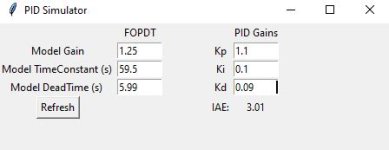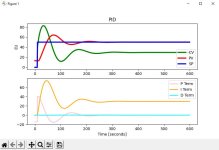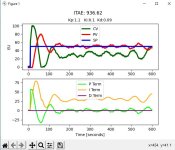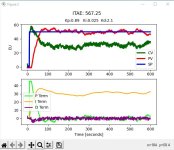Though my memory is far less than perfect, I don't remember recommending an input filter for PID control, though I see no problem with it when applied appropriately. I did suggest adding an input filter as a feature to the Python PID class posted in this thread.
Do you know how to generate transfer functions using Laplace transforms? There is a significant difference between having an input filter and a output filter.
The primary reason for an input filter would be to smooth the display of a PV to shut up ignorant people (i.e. managers) who confuse the presence of noise (Common Cause Variation) with a failure to adequately control the process.
There should be ignorant manager filters. I have an example of this but I won't go into it here.
I find extraordinary the claim that the effect of adding an input filter on the closed loop system is significantly more severe than a filter on the PID output: both will slow down the system response to unfiltered PID output changes.
Yes, but an input low pass filter doesn't change the characteristic equation. An output filter just adds another pole and doesn't change the tuning.
The primary precondition for filtering the input would be the presence normal (Gaussian) random noise in the PV i.e. variation in measurements that is present even if the CV is not changing the the process is otherwise in steady state. I.e. "Common Cause Variation."
Look at my simulation here.
https://deltamotion.com/peter/Mathcad/SOPDT/Mathcad - SOPDT SP vs FC.pdf
I don't implement an input filter. I added noise, dead time, and feedback resolution so the temperature feedback has only 0.1 degree resolution. For the floating control I do implement a dead band the right way. The dead band is not wide enough to remove all the noise but since the integrator has such a long time constant, the noise really makes no difference.
A dead band on PV will do the roughly same thing as an input filter, or an output filter for that matter, when the process is at setpoint,
Close but no. The dead band will ignore drifting from the set point within the dead band. If the noise is Gaussian the noise will filter out to the true value.
Again, this assumes normality of the measurement noise. The purpose is to avoid "chasing noise" i.e. trying to control that which cannot be controlled; in fact, if the is noise in the PV measurement of a process to CV changes, then the PID will actually increase the noise in the PV relative to the uncontrolled system i.e. with the PID turned off.
If the sample time is slow relative to the response of the system then a bad reading may cause the system to respond. However, if the sample time is fast then the noise averages itself out.
Filtering the output, or the input for that matter, will, I suspect, also increase the noise relative to the uncontrolled system, because some noise will always make it through the filter; that increase will be far less than in the unfiltered situation, of course.
The filter will not increase the noise. Some noise may make it through the system but if the sample time is fast relative to the system response it will average out.
A properly-set dead band will ignore the noise once the process is both at setpoint and at steady-state.
Yes, but the system will not be a steady state. It will drift within the dead band. What if the noise is greater than the dead band? I made my simulation difficult on purpose. The dead band is 3 degrees but that is also the standard deviation of the noise so about 35% of the readings are outside the dead band.
The suggestion, in another thread, to oversample the PV, to pick up the highs and lows in order to estimate a mean or median value (PV) being controlled, is conceptually similar to using a dead band.
No! How can you say that? Where is the dead band? There is no dead band. The goal is sample fast enough to get a true reading of the average pressure. Do you remember Nyquist? Actually one needs to sample faster than that.
I, my company, does
a lot of hydraulic servo control. Some applications require doing force control. The ripples from the pumps are evident in small systems as in the thread above. This is one reason why I insist on using accumulators. Accumulators are like a low pass filter in a way but actually the integrate, store, energy in the form of compress nitrogen. This allows one pump to store energy for many actuators whereas servo motor systems must size each drive for the peak power required for each axis.












